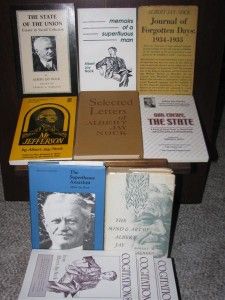BYCU, of Sorts

Nock Notions
Chesterton and Nock were contemporaries. Chesterton was just four years younger (GKC: 1874-1936; Nock: 1870-1945). A strong Chestertonian streak runs through Nock. I think it'd be a stretch to say they shared the same views, but they shared a similar attitude.
I will be looking for these attitudinal parallels, but I found a big one in Nock's journals: "Nature runs so easily to alcohol that it is one of the cheapest products in the world. If the government did not tax alcohol and kept its hands off it entirely, letting it be sold everywhere as freely as peanuts, it would be so cheap that nobody could afford to a saloon." A Journal of These Days, June 18, 1932
That parallels Chesterton made in 1906: “Any policeman will tell you, any man who knows the big cities and the small streets will tell you, that the worst places are always the most private. In the long run the best way is not to send a file of police through these places. The right way is to send a file of the public through these places”¦. Here, as often happens, the middle course is the un-safest. Either have everybody in public-houses or have nobody in them. Either have public-houses so public that they are like cathedrals, or have them so private that they do not exist.”
Chesterton thought alcohol should be liberally available, so did Nock. They both thought that government restrictions on alcohol created more problems.
It's interesting to examine their different perspectives. Chesterton's stemmed from a belief in the innate goodness of things: God is good, He created all things, therefore all things must be good. As a corollary, Chesterton hated Puritanism's dislike for created things. Nock, on the other hand, reached a similar conclusion about alcohol from a different angle, the practical one: alcohol can't be stopped because nature allows it so liberally, so we might as well allow it altogether. They both believed that bad things happen with alcohol when government crimps its natural flow, so even though they don't attack it from the same theological perspective, they approach it from the same political perspective.
